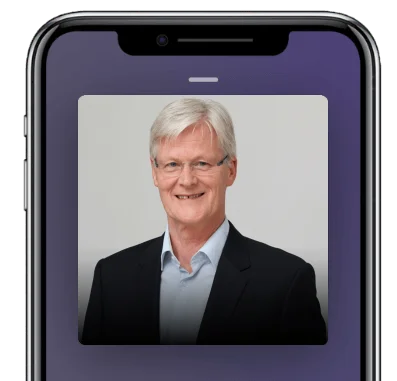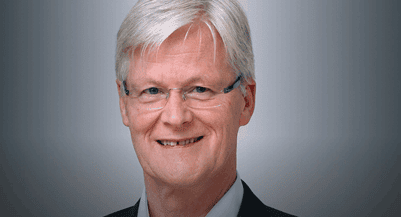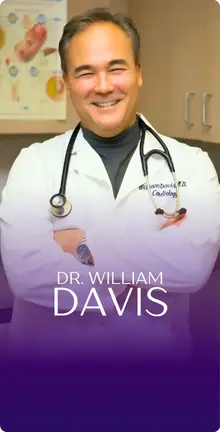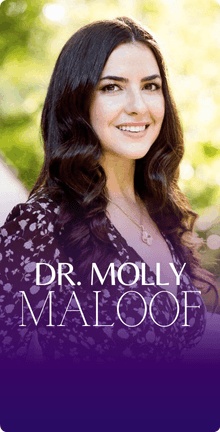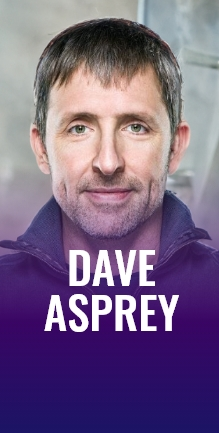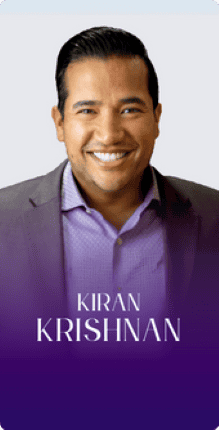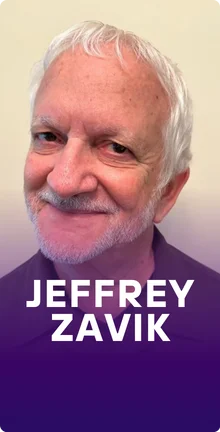In this Episode
- [01:16]Udo starts things off by talking about how we should think about fat, and why it has been demonized. He then explains why a fat-free diet is dangerous.
- [04:51]We learn about some of the rich sources for essential fatty acids, and why we don’t need to get them from fish.
- [07:24]Does Udo recommend getting Omega-3 from fish too, or just from flax? As he answers, he also offers advice on how to use oils and why we should avoid frying foods.
- [11:11]There are three different tests to determine whether someone is deficient in fatty acids, Udo explains.
- [13:40]Udo returns to explaining the problems with cooking with oils, and explains why frying foods is such a major problem.
- [16:47]Stephan points out that the way you feel about the food you’re eating changes how your body processes it.
- [17:07]Udo talks about his mindfulness practice, which he calls “self-knowledge.”
- [19:47]Stephan recommends an earlier Get Yourself Optimized episode with Harville Hendrix and Helen LaKelly Hunt.
- [21:06]If listeners are going to refuse to stop cooking with oil, what’s the best option for them to choose?
- [24:30]Udo breaks down various fat-related terms for listeners, explaining what saturated fats and trans fats are and why they’re problematic.
- [30:00]Udo makes a distinction about Dave Asprey and his Bulletproof diet.
- [34:20]Carbohydrate addiction is eight times stronger than addiction to cocaine, Udo reveals.
- [36:00]Udo clarifies a detail about burning sugars versus fats. The problem is when you eat more sugar or carbs than you burn, he explains.
- [39:57]We learn more about different kinds of fats, this time monounsaturated and polyunsaturated fats.
- [41:54]What are Udo’s feelings about animal fats?
- [45:15]Udo explains that B12 is derived from almost all animal products, and recommends that vegans take it as a supplement.
- [46:41]Udo talks about the meat in grocery stores and how it’s treated.
- [49:55]We hear an inspirational message from Udo about the importance of life over gold or money. He then explains that what we’re doing to the planet is bad for life in general.
- [52:27]Udo describes the long and distasteful process that oils go through before they’re sold in supermarkets.
- [55:16]We learn how Udo got started in working on healthful oils, and what he sees as the foundation of being healthy and sexy. He ties this into his recent project: e Book on Total Sexy Health.
- [59:59]What did Udo mean by saying that death is very different from the outside than from the inside?
- [66:40]We hear more about Udo’s book and how it relates to his mission.
- [68:44]Stephan shares a couple of resources related to the idea that you are not your body, and the idea of tapping into the lightning within you.
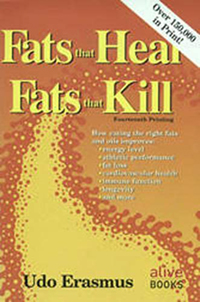
Udo, welcome. It’s great to have you on the show.
Nice to be on, Stephan.
Let’s talk about fats because that’s what you’re most known for, I know you’re doing a lot of other things too that are really fascinating so we’ll get into some of those areas as well but let’s start with fat. Fat has been demonized. Sugar, I think, is the one that needs to be demonized a lot more. Let’s talk about low fat, diets, and fat in general. What’s the deal with fat being demonized and what’s the role of fat? How should we think about fat?
If you go back to 1979, there was the McGovern report on nutrition and health. It was widely publicized and they came to the conclusion that we should eat less fat and more carbs. The food pyramid was changed, they put the carbohydrates on the bottom, that’s what you supposed to eat the most of, they put fats on top. I think it was a response to the damage done to oils by the processing and by the way we use them in food preparation but nobody wanted to finger the processing. What they did is they demonized the oil instead. Here’s what the problem with that is, if you look at the major food groups, we’re talking proteins, fats, and carbs, there are no essential carbs but there are essential amino acids in proteins, and there are essential fatty acids in fats. That should already tell you right there that carbs are the least important of the three pillars of nutrition, not the most important. I don’t know why they didn’t get that because it’s actually pretty obvious if you know even a modicum of nutrition. Of course, the lawyers who are our senators and the congresspeople are not usually schooled in biology or nutrition.
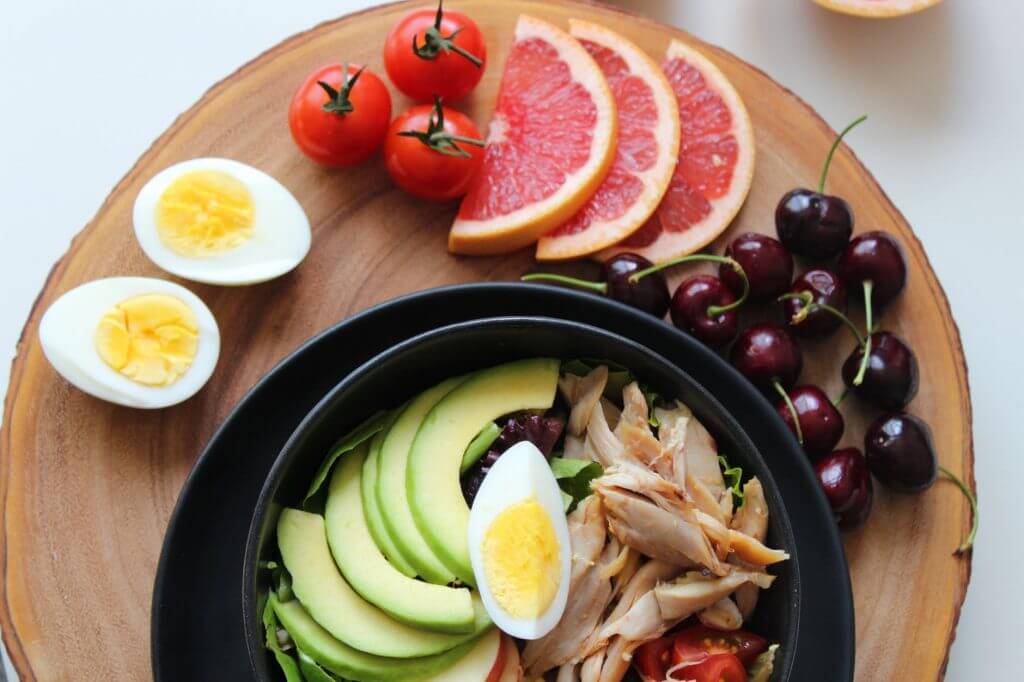
The essential fatty acids, you basically can’t live without them.
Yeah, that’s what essential means, any nutrient that your body can’t make but that you have to have, that you, therefore, have to get outside is called essential. It means that if you don’t get enough, your health goes down, you get deficiency symptoms that are degenerative in nature, they get worse with time. If there’s any essential nutrient that you don’t get enough of long enough, you die. This is really important stuff, this is the core of nutrition and health. If you’re going down because you’re not getting enough of an essential nutrient but before you die you bring enough back into the diet because death, by definition, is not reversible, but if you bring enough of the essential nutrients that are too low back into your diet, then all of the symptoms that come from not getting enough are reserved and you get your health back. That’s because life knows exactly what to do with those nutrients, with those building blocks, with those essential building blocks, provided we take responsibility for making sure that enough of them land in our body so that life can do the job it knows very well how to do if we do our part in that. Omega 3 and Omega 6 are the two essential nutrients that come from fats. If you go on a no fat diet, that will eventually kill you because you will not be getting those two essential nutrients from fats or from oils that you cannot live without, that you cannot live and be healthy without, that you have to have if you wanna live and be healthy.
Omega 3, you normally hear that in relation to fish and fish oil.
Right, but that’s actually not accurate because the essential fatty acids, the Omega 3 is alpha-linolenic acid and its richest source is flax. The Omega 6 is in pretty much all seed oils, it’s called linoleic acid. When you get enough of both of those and they’re balanced properly then your body will make what the fish oils contain, contrary to what the fish oil industry tells you for turf protection.
One thing I had heard is that the particular configuration of the Omega 3 is in a more bioavailable form in fish oil and not so much in flax, is that not true?
No, that’s not true, let me tell you why. If you look at nature, horses eat grass, there’s Omega 3 and 6 in grass in the plant form, alpha-linolenic acid, and linoleic acid. They have DHA in their brain, their eyeballs, and their sperm and they have to convert it. Same with rabbits, same with gorillas, they eat just leaves, and same with elephants, they do the conversion from plants. But there is also 300 million Hindus in the Broman cast in India who are obligate vegetarians, have been obligate vegetarians for at least 5,000 years, don’t cheat, never eaten fish, have never eaten fish oil, and they have as much DHA in their brain, their eyeballs, and their sperm as the rest of us do because if they couldn’t do the conversion, they would be dumb, blind, and sterile.
That’s extinct.
We all have the genes that code for the enzymes.
We all have the genes that code for the enzymes, that do the elongation and desaturation of the basic Omega 3 and Omega 6 in order to make all of the derivatives, including EPA and DHA, which is what you find in fish oil and including a whole bunch of other things that the body makes from them.
Are you a proponent of getting Omega 3 from fish oil as well or you say don’t even do the fish oil, just get it straight from flax?
Not flax either. flax was the first oil I developed in 1986 but flax is unbalanced, it has a lot of Omega 3 but not enough Omega 6. I became Omega 6 deficient on flax oil. I fixed it by eating sunflower seeds which have only Omega 6 and no Omega 3. I basically got out of balance by using flax oil as the only source of fat in my diet. I did that because I wanted to find out where’s the limit? Where are the limits here? Is it okay because there is no diet in nature that is four times higher in Omega 3 than in Omega 6. I wanted to test it, the highest diet at that time that I could find was two and a half times higher in Omega 3 than Omega 6. Out of that came the oil blend I work with, Udo’s Oil, where we made the ratio 2:1, twice as much Omega 3 because 99% of the population doesn’t get enough of those but enough Omega 6 to not become Omega 6 deficient. What I worked with is what I call the Food Oil Foundation. I recommend to people that they take a tablespoon per 50 pounds of body weight per day of the oil, that they mix it in food, and that their intake is spread out over the course of the day. This is the foundation, this is not a supplement, this is the foundation. This is the foundation made with health in mind that should replace the cooking oils that are treated with Drano then window washing acid then bleach then fried before they go in the bottle, before people buy them and that we then use for frying which is the craziest thing we’ve ever invented to do with foods because when you fry oils, they fry your health.
When you fry foods, they fry your health because you’re changing molecules, they’re very, very sensitive and they’re damaged by light auction and heat. We say, “Cook in water, add good oils when the food is on your plate, when you’re gonna eat it.” Do not use oils for frying because fried oils will fry your health. Increase inflammation, increase cancer, and all kinds of problems that are based on inflammation and based on molecules that never existed in nature that we made by processing for which life never made a program, a takedown program or a program to break down simply because they never existed in nature. That’s for the foundation. If you wanna use a supplement on top of that, I recommend that you use krill oil, it is in a better form, it is not damaged, it is absorbed better, it isn’t burned for energy as much, it has its own antioxidant, you need less of it. The fish oils, I have never recommended it right from the beginning because I found out how much damage is done to those oils by the processing and there were also industrial toxins in them. I have never recommended them. I thought, “Because 99% of the population doesn’t get enough Omega 3s, and most people get enough Omega 6 but in a form that’s damaged by processing and by food preparation, let’s get the foundation built right and the let the body do its own conversion.”
Let’s say that I wanna get tested to see if I’m Omega 3 deficient, is there a test that I can go to the doctor for?
Yeah. You can actually do three different tests but people sometimes send me those tests, the doctors will send them to me because they don’t know how to read their own tests. But what you can do is you can do a Serum Fatty Acid Profile that measures the amount of blood that is hooked up to albumen in your blood. The second one you can do is a Red Blood Cell Fatty Acid Profile that tells you what’s going on in your blood cells. And then you can do a Body Fat Fatty Acid Profile that tells you what’s going on in your fat deposits. The differences, the Serum Fatty Acid is what’s going on today, your Blood Fatty Acid Level will tell you what’s been going on over the past 120 days, and the Fat Fatty Acid Profile will tell you what’s been going on in the past couple of years. What does that mean? If you change your diet, let’s say you never took Omega 3s and you decided to take some flaxseed oil that will show up in your serum the day you take it. It’ll show up in your blood cells over the course of the next three or four months and it’ll normalize to the ratio that you’re taking within a matter of maybe 16 months in your fat tissue. If you change it back to something else again, again, it’ll take maybe 16 months to show that change in your fat tissue, three to four months in your blood, and the same day in your serum. The big thing I would say is if you do it right to begin with, you don’t need to do the tests. How do you do it right? You gotta get your Omega 3s, they gotta be in balance with the Omega 6s, they should be both undamaged, made with health in mind, and you take a tablespoon per 50 pounds of body weight per day and you mix it in food, spread it out over the course of the day and you never use it for cooking. It’s a replacement for the cooking oils but you should’ve never cooked with the cooking oils either.
The people who are listening, who are thinking, “I do not wanna give up my weekly fish and chips.” What do you tell them? You’re gonna die young?
Oils damage by processing or by food preparation cause more health problems than any other part of nutrition.
Yeah, seriously. It’s the worst thing we’ve done. Even just when the oils are made, like the cooking oils, oils damage by processing or by food preparation cause more health problems than any other part of nutrition. And oils made with health in mind will alleviate more problems in physical health than any other part of nutrition will, that’s because oils are the most sensitive nutrients, they need the most care and we actually give them the least care. We don’t put anything else on the frying pan by itself and boil it till it smokes, we only do that with oils, with fats and with oils. The more liquid the oil is, the more Omega 6s and Omega 3s, the more essential fatty acids it has in it, the more damage is done to it because saturated fats are fairly stable, you still get damage, you still burn your food but they’re two and a half times more stable than olive oil would be which is two and a half times more stable than Omega 6s are, which are five times more stable than the plant-based Omega 3 is like in flax oil, which is five times more stable than the fish oil Omega 3s are. You’re talking about stuff that is super, super, super sensitive, and is used in the most destructive way of anything we do with nutrition. That’s why it’s so crazy, what we’re doing. That’s why it’s so important to make that change if you like being alive. If you hate your life and you just can’t get over with fats enough, fry everything.
Have some cigarettes with it.
Exactly and jump off of a bridge or whatever. Sometimes people know what they should do but they don’t do it. My view on that is if your life is crap, why would you care about anything? That’s true for how we treat the environment, that’s true how we treat our body, that’s true how we treat each other. When your life is crap, you don’t care about much. The question is how do you un-crap your life? If you could just sit down and shut up and get quiet and breathe as lightly as you can and sit still and see how long you can sit still and see how deeply still you can become. You will discover that your life is unbelievably magnificent as soon as you get out of your crap ideas in your head. When you feel good about being alive then it’s like, “Oh, I’d like to hang around, I’d like to be around so I’m gonna take care of myself.” We know so much more about health than we put into practice. Honestly, quality of life begins not with food but begins with how we feel inside and close we are to ourselves.
I’ve heard that the way that you feel about the food that you’re taking in changes how it gets processed by your body.
Yeah. There is something to that as well.
Interesting. Do you have a mindfulness practice or something or meditation that you’re doing?
I don’t call it meditation, meditation means so many things. If you mean bringing your awareness back home to the source of your own being inside of you, then you could call it meditation. I call it self-knowledge. Socrates who said, “Know thyself.” Why did he say that? He didn’t say know everything except yourself, he said know yourself. He said, “The unexamined life is not worth living.” That’s true in practice. If you’re not in touch with your own life, with what you are, then you get caught up in reaction to everything, you look at all the stuff going on everywhere in the world, reaction, reaction, reaction. There are people who don’t get into all that reaction because it’s okay to sit still and not do anything, it’s okay to be doing what you need to be doing. You don’t have to be making a million dollars, you don’t have to be making a trillion dollars. People who think that money will bring them happiness, they’ll say, “I’ll be happy when I get a million dollars.” Then they get a million dollars, then they got three days, “Yey! I did it.” And then they’re back to that same dissatisfaction that drove them to make a million dollars then they say, “I guess I didn’t think big enough. I’ll be happy when I make $10 million.”
The unexamined life is not worth living. – Socrates
Guess what, that doesn’t do it either because the happiness that you’re looking for in all of your projects, you were born with, and it’s inside of you, nothing on the outside will give you what that connection to yourself where you really feel whole because you were born whole but your awareness is out there and your wholeness is in here. Bring your awareness home, that’s where your insight is, that’s where your inspiration is, that’s where your peace is, that’s where your love is. If you get in touch with that, you can’t even do a relationship because you see the love in her, she sees the love in you. You can’t get to it in yourself to bring it into the relationship, she can’t get to it inside of herself to bring it into the relationship, guess what you’re gonna do, you’re gonna be disappointed and you’re gonna screw up your relationship. Where’s the love supposed to come from if neither people in the relationship can get to bring it out? That’s why self-knowledge is so important and affects everything.
So true. For those listeners who are into improving your relationship, you’ll be definitely amazed by the episode with Harville Hendrix and Helen LaKelly Hunt. They’re powerhouses and just created an amazing program called Imago Couples Therapy. Udo, I guess you’re familiar with that.
I’m a little familiar with it. What I say to people is before you’re ready for a relationship with somebody else, how about having a relationship with your own life? Because if you haven’t committed to being present in your own life, why would you commit to being present in anybody else’s life? That doesn’t even make sense.
If you can’t love yourself, how can you love others? It just makes all the sense in the world. Listeners, if you’re interested in that episode with Harville Hendrix and Helen LaKelly Hunt, Harville is the creator of Imago Couple’s Therapy, he is an amazing person. That episode is 22. Let’s jump back to the oils and then let’s get more into the relationship stuff because I know there are some really interesting things that you’re doing these days in that regard. I wanted to make it very clear for our listeners, if they are gonna choose to cook with oil, what is the least damaging option for them to choose?
Water.
If they refused and they’re going to cook with oil, what is less damaging? Olive oil I guess is bad but maybe coconut oil is a little bit less bad.
No. You know what, coconut has had a lot of good press and now it’s starting to get bad press because coconut oil increases your LDL Cholesterol. There is a book that was written about coconut oil by someone who basically made all the claims that can be legitimately made for Omega 3s that are essential was being made for coconut oil which has virtually no essential fatty acids and a lot of saturated fats in it. If you fry with oils, the hardest fat will get you the least damage but you will still turn your foods brown so you’re still burning your food and you’re still creating molecules that never exist in nature. Those molecules will be toxic to your body and you will mess up your own health. What I say to people, “I know you like fried food, go in your house, pick out your frying pan, turn it upside down, hit yourself on the head with it really hard so it’s associated with pain and then throw it out because that thing will give you serious pain if you continue to do that.” If you look at life’s standard for eating, every creature on the planet that eats food eats it fresh, whole, raw, and organic, that’s life’s standard for creatures. How far from that have we wandered off?
By the way, most creatures don’t get the kinds of degenerative diseases we get because they never create the damage in their foods like we do by our processing and food preparation habits. We ought to head in that direction if we wanna be healthy. If you gotta make changes, then go from frying to cooking in water and go from cooking in water to eating raw as much as you can. If the food is contaminated then you gotta kill the bacteria so you would have to cook it but cook it in water, that’s the direction to go in. When you say there is no fat that’s good for frying, there are some fats that are less bad than the liquid oils but I can’t recommend them because my goal is health and for health, you would not be doing that.
It’s like the doctor saying, “I guess you can vape.”
Sometimes the dietitians say, “You know, frying is not that good for you but you gotta enjoy your food so it’s okay.” It’s not okay. If you wanna be healthy, it’s not okay.
If we can differentiate, for our listeners here, saturated versus unsaturated, hydrogenated, trans fats, monounsaturated, poly, etcetera, a lot of different terminology. Can you break this down for us?
Most creatures don’t get the kinds of degenerative diseases we get because they never create the damage in their foods like we do.
It’s really boring because researchers tend to be very boring people, not all of them but they have their special terms. Sometimes when they talk to each other they know what they’re talking about, anybody who’s not part of their little group doesn’t know what they’re talking about because it’s so technical, but let me just run through it quickly, I find it boring too. Saturated is the hard fats except when they’re really short-chained then they’re liquid. The hard fats like pork, beef, butter, coconut. The reason why they’re hard at room temperature is because they have a lot of saturated fats, those are like long strings, they crystallize, they stick together quite well, that’s why they’re hard at room temperature. The oils have bent molecules because they have double bonds in them, when you bend the molecule, they don’t stack together so well that’s why they’re liquid at room temperature. The more double bonds they have, Omega 6 has two, Omega 3 has three, fish oil has five or six double bonds, the more bent the molecule becomes because it bends around the double bond. That means the more liquid it is. Omega 3s won’t go hard in the fridge, Omega 6 won’t either, but Omega 9 which only have one double bond, if you put olive oil in your fridge, you can see white flax in it or sometimes it goes completely solid, that’s because they crystallize on a lower temperature, liquid or room temperature but hard in the fridge. In order to make Omega 6 and Omega 3 freeze, you have to put them in the freezer, they’ll freeze in the freezer. They’ll all freeze and become solid, they just do it at lower temperatures and they are more liquid at room temperature. The more liquid they are, the more they flow but the more liquid they are, the more sensitive they are also to damage them by light, by auction, and by heat which is why the more liquid they are or the more Omega 3s they contain, the more important it is that you do not use them for high heat food preparation. Trans fatty acids, there are some in nature but most of our trans fatty acids in shortenings and margarine were by high heat, we twisted the molecule so the bend in it became straight and now this thing is also solid at room temperature. They used to call it hardening oils, the reason they did that is because they end up having a better shelf life, they would hydrogenate them, they would destroy some of the double bonds and the twisting of the molecules was part of what happened during that process.
Of course, they were fingered about ten years ago as being toxic, double risk of heart attack, increase cancer, make platelets more sticky, interfere with reproduction in animals, we don’t have a human study for that, killing at least 30,000 Americans every year, that’s was Harvard School of Public Health came out with, Walter Willett, who did those studies with his group. They got fingered and now everybody has to put them on the label, they didn’t have to be put on the label from 1911 when they were first created by hydrogenation until 10 years ago, almost 100 years. There was no requirement to put them on the label, now they have to be put on the label. If you have them in your stuff, in restaurants, you need to let people know because basically they’re now saying, “We don’t want them in the food supply. Don’t use them.” That’s the trans fatty acids. They’re hydrogenated, they harden them by bubbling hydrogen through it and then they destroy the double bonds and then straighten up the molecule. In the process, when they’re partially through the process, they twist the molecule. It’s a high heat process and that’s how margarine and shortenings were made out of liquid oils, how hard fats were made out of liquid oils. You only needed maybe 40% of the molecules to be hardened for the whole thing to harden. This is all industrial processing with damage that turns something that is natural into something that’s not natural. For years, people said margarine was better than butter but it turned out it never was. Butter’s bad enough but margarine is way worse because trans fatty acids cause even more problem than saturated fats. Saturated fats especially cause problems when you don’t have enough Omega 3s in your diet because your Omega 3s make platelets less sticky and increase insulin sensitivity and saturated fats do the opposite, they make your platelets more sticky and they make you more insulin sensitive. If you optimize your Omega 3s in the diet, you don’t have to worry that much about the saturated fats that you naturally get in foods.
The people who are listening who are big fans of Dave Asprey and the Bulletproof diet are not gonna be happy to hear what you just said about butter.
Let me make a distinction. Dave Asprey works with medium-chain triglycerides. The medium-chain triglycerides that he gets are carbon 8, carbon 10; they’re liquid at room temperature. They work very well in Bulletproof Coffee. They increase fat burning in the body, they actually make you ketogenic and they are a whole lot better than carbs for energy production. But the big issue that needs to be addressed, you can eat butter if you’ve optimized your Omega 3s and 6s but Omega 3s and 6s are essential and are more important than whether you eat butter or not, whether you eat coconut or not, whether you eat medium chain triglycerides or not. The only thing from fats you absolutely have to have to live and be healthy is enough Omega 3 balanced with enough Omega 6, undamaged, made with health in mind, in the right ratio, and used in a way that doesn’t damage them in food preparation. What Dave Asprey does is coffee gives you the juice and fats give you the fuel. When you juice your body with coffee and use saturated fats as your fuel, that’s better than using carbohydrates because you get stable energy, you don’t get the blood sugar swings, you don’t get the insulin spikes, you don’t get the mood swings, you don’t get the overeating that comes from burning the fats, from turning carbs into fats and then getting cravings, so you don’t do the overeating that leads to overweight, that leads to obesity, that leads to diabetes, that leads to heart attacks.
Most diabetics, carb addicts, die of cardiovascular disease.
Most diabetics, carb addicts, die of cardiovascular disease. Dave Asprey’s Bulletproof Coffee is better for people who need to lose weight than carbs because you don’t get all of those problems from fats. Fats are better fuel and historically have always been better fuel or the key fuel for human beings because you can store 300 pounds of fat in your body, you can only store a pound of carbs. When you eat too many carbs, your body turns them into fats and in the process causes you lots of problems. If you’re 8% body fat, average weight 154 pounds, you can run 300 miles on the fat in your body and you will still have 4% fat left in your body. On 4% of your body weight is fat, you can run 300 miles and on that pound of carbs you can load, you can only run about 20 miles, that’s why marathoners used to always hit the walls when they use carbs as their fuel. We told them, “No, no, no, you should carb deplete, not carb load. Make sure your fat burning is burned on then run your race on body fats.” They didn’t all do what we said because that was completely contrary to what they had been told but the ones who did, they said, “That was awesome. I ran a marathon, and at the end, I felt I had enough energy to run another one.” That’s how it works. Fat burning has to be turned on genetically. If you’re eating carbs and burning carbs, as long as you got carbs to burn, the fat burning genes stay turned off until the carbs are gone. Make sure the carbs are gone before you start the race and your fat burning genes are turned on and then you get stable energy and you can go. If you have Omega 3s in your diet, they make the fats burn even better.
It’s a really good distinction and it sounds like you’re not dismissing the Bulletproof Diet, you just want people to make wise decisions about the fats that they incorporate into their Bulletproof Diet and they don’t become Omega 3 or Omega 6 deficient in the process.
That’s the key.
Got it.
In my way of thinking, even saturated fats and even coconut oil are better fuel for people who need to lose weight than carbohydrates are. Carbohydrate addiction has been measured to be eight times stronger than addiction to cocaine. When I saw that, that’s exactly my line, “Wow, really?” But you know that because sometimes people can’t help themselves. They get that craving because blood sugar goes down and the body is screaming eat or die and they’re used to eating carbs then they gorge and it takes a while to digest and absorb the sugar to break down the carbs into sugar and absorb it. By the time the sugar is normal, they’ve eaten more than they needed, they just started another fat production cycle and their craving cycle. Why is that? Cocaine is not a fuel for your body, sugar is fuel for your body, if you don’t have any fuel, you die, that’s why it’s so strong. In carbs, we didn’t have fields of wheat 100,000 years ago, that all started maybe 10,000 or 20,000 years ago but we didn’t have the carbs, we ate green foods and seeds and nuts and found a little bit here and a little bit there and we were physically active and that’s all changed. We have more carbs and less activity and that’s when carbs become counterproductive for health.
When we’re sugar burning, that’s not a good mode to be in, we should be in fat burning mode instead.
Let me correct you a little bit. If you burn the sugar, it’s okay. The problem is when you don’t burn it, when you ate more than you burned, the rest has to be turned into fat and then all of the problems come with the blood sugar. I have this little slogan, “When you eat carbs, either you burn them or you’re gonna wear them.” They turn into fat so you wear the fat. Athletes and people with big muscles can burn a lot more carbs than skinny people or sedentary people. But if you don’t burn them, you’re gonna wear them. If you’re having problems like 65% of the population does with weight management then you need to be off the carbs and you need to be using good fats for your fuel and you need to make sure that the Omega 3 and 6 are optimized and then you run your life on good fats, fats, and greens and works unbelievably well.
Got it.
You need some protein but in terms of fuel, fats are better fuel than carbs.
You wanna burn the fat so that you lose the weight. If you can get into a fat-burning mode, that’s gonna be good for your weight management. Mark Sisson, are you familiar with Mark? He talks about this a lot in the episode where I interviewed him, that’s episode 63. Listeners, if you wanna check that out, it’s awesome. One of my friends in the secret society that I’m in, he listened to that episode and switched from just doing high-intensity workouts to low-intensity workouts based on what he heard in that episode. He dropped, I think it was 15 pounds within a couple of months. These were pounds that he was just not able to drop before he switched to low-intensity workouts. It just never dawned on him to do that, to try low-intensity workouts to drop the weight. You are a proponent of Dave Asprey’s approach, that sounds like.
I use oils the way nature makes them.
Ketogenic seems to work although I don’t pay attention to ketogenesis, I pay attention to getting the essential fatty acids and then whatever that goes with them because all oils that have essential fatty acids also have some monounsaturates, also have some saturates. I use oils the way nature makes them. What’s really interesting about it is that if you look at carbs in terms of thermogenesis, thermogenesis means they increase metabolic rate and therefore increase fat burning. Carbs don’t give you any, proteins give you a little bit of thermogenesis, Omega 3s gives you a ton of thermogenesis. They keep you warm in winter and they crank up your energy production because they like oxygen. If you leave them out, they go rancid quickly but they bring oxygen into the body. Oxidation is the process by which your energy gets made and they increase oxidation rate, that means you have more energy, that means you have more stamina, that means you can produce more, that means you can perform better, it will take you longer to get tired, and you recover quicker from fatigue once you do get tired because you get tired because of oxygen depth and you need oxygen to build down that oxygen depth and Omega 3s help to improve that cycle.
I’m trying to wrap my head around all that, that’s awesome. By the way listeners, there is an episode where I interviewed Dave Asprey as well and it is awesome, episode 38. Did we define monounsaturated and polyunsaturated yet? I don’t recall.
We did not. It just means that’s about double bonds, monounsaturated means there is one double bond in the molecule and the Omega 9s which are not essential which you’ll find in olive oil, olive oil is about 80% monounsaturated. They’re saturated, no double bonds, monounsaturated, one double bond, polyunsaturated, more than one double bond, two or more. The polyunsaturates, Omega 6 which is essential has two double bonds, alpha-linolenic acid which is essential. Omega 3 has three double bonds and then the fish oil Omega 3 derivatives that the body can make from those two has five or six double bonds, they are also polyunsaturated.
Krill oil?
Krill oil has EPA and DHA and those are also polyunsaturated. But here’s the problem, polyunsaturated means more than one double bond or two or more double bonds, poly just means many. You can get fatty acids that are polyunsaturated but that would be twisted. Polyunsaturates are not necessarily healthy. You can have damaged polyunsaturates, they are still polyunsaturated but they’ll be bad for your health. The essential fatty acids are also polyunsaturated but they are essential for your health. This is messy stuff because of that because unless you’re a guy in the lab working on fats, if you’re just on the street then polyunsaturated is a confusing term and I personally don’t use them at all but it comes up and you see it in some of the literature.
What are your feelings or thoughts about animal fats? Is that something that you wanna avoid and try to go for the healthier oils like the flaxseed and sunflower oil?
No, Udo’s Oil.
That’s got the right balance.
Let me answer the question. There is definitely research that says plant-based oils or plant-based fats have advantages for health over animal-based. What is not clear from the literature is whether the animal fats are worse for us because of the hormones and the pesticides and the antibiotics and whatever other crap they feed the animals because honestly, what is done commercially to animals in order to make dead meat look fresh and make it keep longer than meat would keep because meat would rot pretty quick when it’s dead. There’s a lot of stuff that gets put into that and then you have associations with disease from that because this is not done with health in mind, this is done with shelf life and good looks in mind and all of that. It’s not clear whether the saturated fat on a wild caribou in Northern British Columbia that lives in a place that is relatively clean would cause you the same problems as the fat that we get from pork or beef or lamb that is commercially grown, that’s not clear. We may be blaming the meat for what should be blamed on the processing here again.
But the research generally says these days, if you want the longest life and the healthiest life, you pretty much are gonna do that best if you’re on a whole food plant-based diet and you take a supplement of B12 because B12 is an animal product and that’s proof that we are not obligate vegans. But, I think, in the past when we only had rocks to hunt with, we ate a lot more vegetables than meat because animals run away and plants don’t run away, they don’t fight back, they’re really easy to hunt down and kill. When we call ourselves hunter-gatherers, it sounds so romantic and testosterone-ish but we were actually mostly gatherers and lucky, sometimes, when we were hunters. Even now when somebody goes hunting, they have a rifle which is something that gives you a huge advantage over the animal and they come home without meat a lot of times. Imagine when they only had rocks to hunt with, maybe get a squirrel once in a while or a bird that fell out of a nest before it could fly or they had worms in their grain. There was always a little bit of animal but not a lot, maybe three times a year, maybe once a month, maybe once a week but we’re doing it everyday and every meal.
B12 is an animal product.
It is crazy, I think.
It is not getting us a healthier life.
Where is B12 derived from?
B12 is an animal product.
In every animal product.
Yup, pretty much. You eat worms, you get B12. You eat steak, you get B12. You eat liver, you get B12. Fish, you get B12, it’s an animal product. There are people who say that there are bacteria that make it but no one has really done a good job of isolating that and proving that you can be vegetarian and eat certain foods and get you B12. Best you take it because when you don’t get B12, it’s also essential, if you don’t get enough B12 long enough then you go down, that’s the law.
You can be vegetarian and get B12 from eggs and dairy but if you’re a vegan, you won’t be getting B12.
No, then you get a supplement. It’s available as a supplement. If you wanna be vegan, you need to do all your plants but you need to take a supplement of vitamin B12.
That’s not a vegan product so you’re actually not a vegan.
They can make it synthetically.
Okay, got it. All this processing just freaks me out hearing you describe things like deodorizing and bleaching and dranoing and frying the oil and all those sort of stuff before it even ends up in your house. They do all sorts of chemical processes, all those nasty stuff to it just so it looks pretty.
Let me tell you a story just because it’s worth telling. Somebody went to the grocery stores and looked at how they deal with their meat. What they do is they get the meat and put it out and it’s relatively fresh although it’s not the same as when a wolf kills a deer and eats it, it’s not fresh like that. It’s maybe a week old that’s been refrigerated. They put it out and it’s red. When it sits there for awhile, it starts to get gray. When it gets gray, it doesn’t look good so they take it in the back and they wash it with blood and they put it back out. Now it’s been out there for even longer and then it starts to rot and starts to smell. They take it in the back and they marinate it with herbs and spices and then they put it out again and they charge more for it. The people who watched this process said, about a quarter of the stores, not all of them do this but a quarter of the stores that sell meat have that some kind of a routine like that going. If you kill a chicken and you let it lie around or a cow and lie around, the water seeps out of the meat and the meat becomes weird. How do you keep the water in the meat so it looks fresh? They put chemicals in it, those chemicals are not good for you but they make the meat look like it still got the juice in it. There is all kinds of stuff that’s going on and none of it is done to improve people’s health, it’s always done to serve the industry, to give it a longer shelf life, to make it keep longer and some of it is just not really good for human health.
Freezing it works, cooling it works, that’s not a health-damaging process but some of the other chemicals they use. What you do doesn’t have to be put on your product as long as you can get it called a processing aid. Processing aids are not required to be on the label. There is always the industry lobbies and the government protects the industry because it’s all about money. They will allow things to be called processing aids and then they don’t have to tell you what they’ve actually done and you don’t know until somebody tells you. There’s a lot that’s going on. If you get really confused, honestly, fresh, whole, raw, organic, if you have a house, tear up your lawn, grow your own vegetables on your front and back lawn then you know what’s in those vegetables because you grew them yourself, you put pesticides on them but you know if you did. Or you can use it but you’ll know what you did whereas when you depend on somebody else, you don’t know what they did. You don’t know who’s telling the truth and who’s lying and what are they hiding, it’s difficult. People don’t enjoy their life enough to walk straight and narrow even though that’s the best life. If you’re not working for life, you’re working for money. If you’re working for life then you’ll sacrifice money for life when necessary, if you’re working for money then you’ll sacrifice life for money when necessary when push comes to shove. Fundamentally, if you think about it, life is the only thing that’s really precious on this planet, it makes the planet unique, is delicate, and life and gold and everything that we put so much value on is supposed to be put in the service of life because life is the thing that is special on this planet.
Life is the only thing that’s really precious on this planet
Money and gold and all sorts of precious metals, all that should be secondary but some people put it at the top of the heat because they’re short term.
It’s easy to forget it, and we have a lot of encouragement to not think about it. But I’m saying, “No, think about it.” What we’re doing to the planet is very bad for life. For a while it’s just bad for the environment and we don’t know but eventually, that’d be bad for us too. There are people who say, “We’re not gonna make the rest of this century if we don’t make massive changes in the way we think about ourselves and life and this planet.” Everybody knows, we sorta all know this. Big things are coming and big changes need to be made and they begin with making those changes in our own lives.
It’s not sustainable. What we’re doing to ourselves and what we’re doing to the environment is not sustainable.
You wanna change it, be the change you wanna see, be the piece you wanna take, be the truth you wanna see, it starts at home.
So true. You walked through a bit on what happens to the animals to process the meat to make it look more palatable when it’s on the shelf in the meat section. What about the processing that happens to the oils? What exactly does it mean they “Drano” the oil?
They treat the oil with sodium hydroxide which is a very corrosive base, then they treat it with phosphoric acid which is a very corrosive acid, then they bleach it because the color molecules in the oil attract light and then the light damages the oil, they wanna get those out. They bleach the oil with bleaching clays that makes the oil go rancid and now they have to get rid of the rancidity which makes the oil smell bad so they have to deodorize it. To deodorize it, they have to heat the oil to frying temperature, high end of frying temperature, sometimes as high as 450 degrees Fahrenheit. This is like the high end of frying temperature. Literally, you’re getting an oil that has already been fried, the antioxidant has been removed and it put in synthetic ones, the color molecules, the flavor molecules have been removed and all of those things are part of what was in the plant. Of course, you remove the protein and the fiber, and whatever else was in the seed as well.
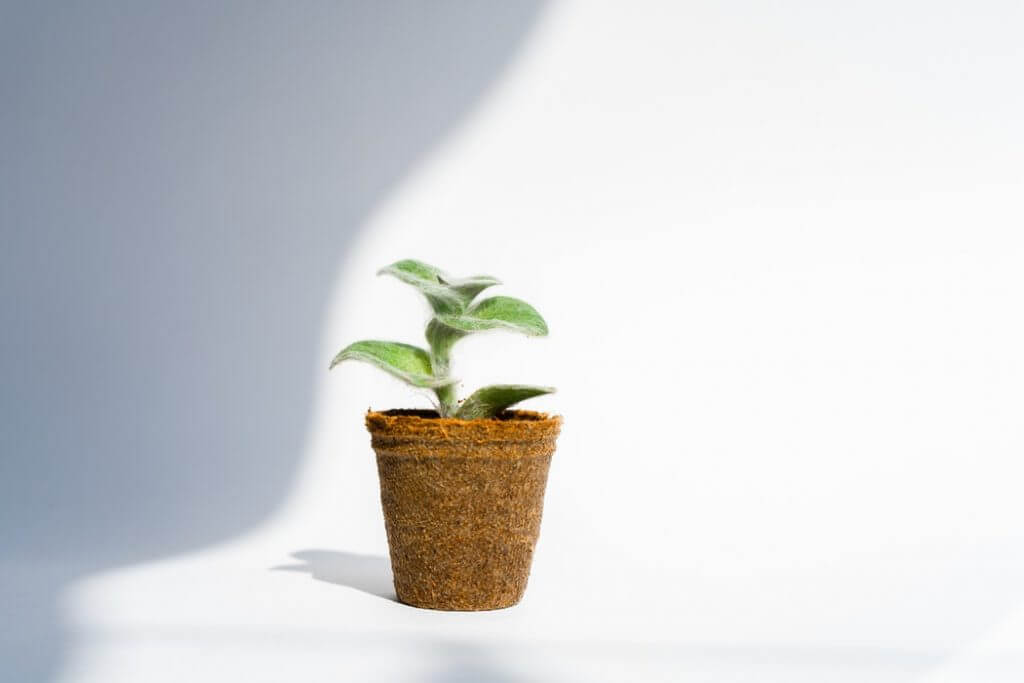
That sounds awful.
The same thing we do with grains, we turn them into white flour and white sugar. We talk about white oils, white fats, white sugar, white flour.
The white devil.
A lot of our degenerative diseases, the cause of those is not a weakness in our genes, the cause of most of those is the damage done to foods the way nature made them by processing. Processing is the big deal. The processing is usually not done with health in mind, you could if that was your issue. We talk about making oils with health in mind but we have to make very tight systems to protect the oil from the time it’s closed in the seed to the time it’s closed in the bottle so that no light auction or heat gets to damage those oils. That takes retentive attention to detail. You can’t just say good enough for government work. Most people don’t wanna pay that kind of attention but it makes a difference when you do. If you don’t wanna do that then don’t get into business then grow vegetables and grow stuff and eat it fresh and get it done that way because nature’s meticulous in the way it puts food together too.
It’s all very miraculous.
Yeah, unbelievable.
Before we close out the episode, can you share what you’re up to these days? You’ve got this new project you’re doing that we’re talking about.
I got poisoned by pesticides, that’s what got me started on what ended up in the oils that I’m doing. But I came out of the second world war, I was not yet free when we were refugees being chased in tanks and trucks by the communist and the allies were shooting us from planes. I have not a lot of use for war on either side. When I was six years old I started thinking about how people could live together in harmony and I said, “I’m gonna find out how to do that.” Out of that, I went through science to find out how things work because I lived in a pretty chaotic world. Then I went to the biosciences, how creatures work. Then I went to psychology, how thinking works. Then I went into self-knowledge because I really needed to know how I work. Out of that came wanting to do something that we can use to live together in harmony on this planet. I found it, that’s what I’m doing. I’m really proud of this thing, it’s called The Book on Total Sexy Health. The reason it’s called that is everybody wants to be sexy and sexy doesn’t just mean having sex, sexy means being vital, being vibrant, being attractive, full-on, enthusiastic, inspired, fully present. Why health? Because everything affects health. You have to really look at everything if you wanna live a really healthy life, that means how you feel in your heart whether you’re in touch with the energy that is your life, those are internal processes, whether you’re inspired about something, enthusiastic to where you go with your day and then there is a food and fitness and water stuff that is for the body then there is how you deal with crisis, survival smarts, then there is how you are socially, how you are in nature, and how you are with the big picture that we live and die, very small creatures in a very large universe. If you’re in line and okay with all of those then you’re going to be your major sexy and your major healthy.
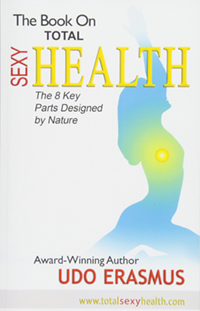
Health is the foundation of sexy. Any one of those eight that you get out of line with, the part of sexy that that confers on you leaves the building. When you get back in line with it, that sexy comes back. That’s why it’s The Book on Total Sexy Health. Under that topic, I can literally address every problem on the planet. For instance, war is not good for health, lying is not good for health, politics, the way it’s practiced these days, is not good for health, cooking with oil is not good for health. We can go through all the problems we have on the planet, destroying the environment we live in, not good for health, being unkind to other people, and not treating them with love, not good, not being fully present in all of your being, not good for health. You turn that around, if you can be fully present in all of your being and in the world, you will have an amazing life and you can literally write your ticket. Whatever you wanna do, wherever you wanna go, whoever you wanna be, whatever contribution you can make, you wanna make to life, you’re absolutely gonna be able to do that. But if you’re not fully present in all of your being, you don’t even know what you have to give. The wise people always said, “Make that your first priority.” What does it take to be fully present in all of your being so you can live a fully full, rich, beautiful life. That’s what The Book on Total Sexy Health is about, it’s an overview of those eight areas. There’s a chapter on death, death is very different from the outside than it is from the inside. It took me 69 years to write the book, I started when I was six years old to think about that topic, I finally got it out. I’m very proud of this one.
The book is available on Amazon.
Only on Amazon. The Book on Total Sexy Health Udo Erasmus.
One thing that really intrigues me of what you just said, a lot of what it does but one thing in particular I wanna really clarify here before we finish up, what do you mean by death is very different on the inside versus as it’s experienced from the outside?
When you look at the world, you see the surface of everything and you see the heart of nothing. You look at me, you see the skin on my face and you see my blue eyes and you see my silver hair but you don’t see my brain and you don’t see the blood in the arteries, in the blood vessels in my brain and you don’t see the light inside of me. We look at death from the outside, it’s messy. The faculties fail and you can’t get up and your breathing gets shallow and you get [01:05:27] eye. It’s all been described by doctors, the process of dying, the process of the body basically coming apart. You know that the body then decomposes eventually and everything gets recycled, the water goes back in the soil as water and ends up in the ocean, the dust to the minerals end up in the soil and the oxygen ends up in the atmosphere, carbon dioxide. All of that gets recycled but what is the process? What is the experience of the person who’s dying? That’d be nice to know. That experience is ecstatic once you let go. When people struggle when they’re dying, it’s because they’re trying to hang on to their beliefs and they’re trying to hang on to all the things on the outside that they’d become attached. When you don’t wanna let them go at a time when you have to let them go, then there’s a struggle there, or you wanna hang on to your body at a time when your life and your body are parting company. You are not your body. If somebody asks you, whose body is that? What do you say? You say, “It’s my body.” Everybody does. Think about it, it’s even in the language. If this is my body, I am not the body, I’m the owner of the body, the body is my possession. If that’s true that I’m the owner of the body, who is the owner of the body? Mostly we don’t know because we never look that life is the owner of the body. At death, life and the body part company, your awareness that is being out there and in your mind and in your body, your awareness falls back into its source in life which is where it came from which is where it was when you were a baby in the womb because there was nothing to go out to. The process of that falling back is ecstatic.
The idea of fear, death, and all that, yeah, your body is gonna go but you know that, you know that anyway. To live your life thinking you are the body and always trying to protect your body and always trying to save your body. We do most everything for our body but take some time to get to know yourself as the life that you are, that’s where your fulfillment is, that’s where your piece lives, that’s where your joy is, that’s where your power is, that’s where your wisdom comes from. It doesn’t come from your body because without life, the body has nothing. It doesn’t work, it can’t do anything, doesn’t think, isn’t aware, knows nothing, why not get to know what you are? That actually never dies. What was alive in my mother who passed on is still alive, I can talk to her and she’s not burdened by her cultural and her experiential and her war experiences and all of that. I can talk to her in the form of life that we all are, that we have always been, and of course I can also talk to myself in that form. Maybe it’s not a bad idea if eight billion people were to talk to their own life, that’s where their master lives, that’s where the control lives, that’s where the power is, that’s where everything we need, why not ask your questions of how to live of the life that you are that’s living you. The goal that I live into is eight billion people could live their lives, live up from within because the light is already within them, they are that light, it’s just a matter of looking into it instead of looking away from it. If they did that, they would feel so taken care of because life takes perfect care of everyone all the time, through all the dramas and all the traumas and everything. They would feel so taken care of that they wouldn’t wanna steal each other’s shit. When we stop stealing each other’s shit, we can live in harmony together.
When we feel so taken care of that we can live in harmony together, it is very easy to make sure that the basic needs of every other human being are also met. The only reason we’re not doing that is we hang on to stuff that we don’t even need and we do that because we fear that if we let go of what we don’t even need, we would be even more discontent. The moment discontent is taken care of because we’re present in our own life, fully present in our life, nobody has to sacrifice. I’ve eaten, you haven’t eaten. I got food that I don’t need, why would I not give that to you? But it won’t happen until we’ve gotten present in our own life, that’s where all the work needs to be done. If you look at all the problems on the planet, they all began with a disconnection from ourselves and then trying to compensate, trying to make up for it, trying to get that taken care of by doing something on the outside when actually the only way it can be taken care of is on the inside because the disconnection is an inner disconnection, not an outer disconnection. The reconnection is an inner reconnection, that’s where we have to go if we are going to become sustainable. Out of that reconnection comes the love for life and comes the love for others and comes the love for the planet and comes the willingness to make sure that it works for everybody.
I’m very hopeful that we’re in for a big reawakening as species. What you described is gonna come to pass very soon.
It’s about how to become who we are by what we are the way life made us – what we are by life, what we are by nature.
Me too. That’s what I’m gonna spend the next 30 years of my life doing. The Book on Total Sexy Health is an overview of that project. The subtitle is The Eight Key Parts Designed by Nature. It’s about how to become who we are, not so much by what people told us we are but by what we are the way life made us, what we are by life, what we are by nature.
I love the concept or the thought that I’m not body, I’m not my thoughts, I’m distinct from my physical form.
The human being is a composite of awareness, energy, mind, mental, body, group, nature, and the big picture. We’re composite. Every part of it plays a role, it’s really nice when we’re actually present to all that and then life is amazing, it’s amazing because I get to live it instead of scratching something together for myself because I think I don’t have, I hide so much. I have more than enough, I’m opulently stinking filthy freak rich and it has nothing to do with money.
When you have that abundance mindset then you’re not stingy and you’re not living in scarcity. When you live in scarcity, you attract more scarcity, that void attracts more voids in every aspect of your life.
When you stinking filthy freaking rich with life, it’s attractive and it also makes your business run better if you’re in some kind of business.
This has been an amazing, awesome, wonderful, insightful, inspiring discussion. Thank you so much for joining us, Udo. I also wanna share a couple of additional resources for our listeners that relate to the last thing that we were talking about, the discussion about I’m not my body. I covered in an episode with Sanjay Sabnani, that was episode 50. I love that episode and I know you guys will too. The idea and discussion around the light being within you and tapping into the light is something we discussed with Yehuda Ashkenazi in episode number 98.
Can I say one more thing?
The human being is a composite of awareness, energy, mind, your mental, body, group, nature, and the big picture. Share on XAbsolutely.
udoschoice.com is my oil website, my physical stuff website, totalsexyhealth.com will be my book website for this book, it’s not quite up yet. On Facebook, we do interactive at Udo’s Choice Official and I have my own website, Udo Erasmus on Facebook.
Awesome. Thank you, Udo. Thank you, listeners. This is Stephan Spencer signing off, this is the host of Get Yourself Optimized. We’ll catch you next week on the next episode.
Important Links
Connect with Udo Erasmus
Books

